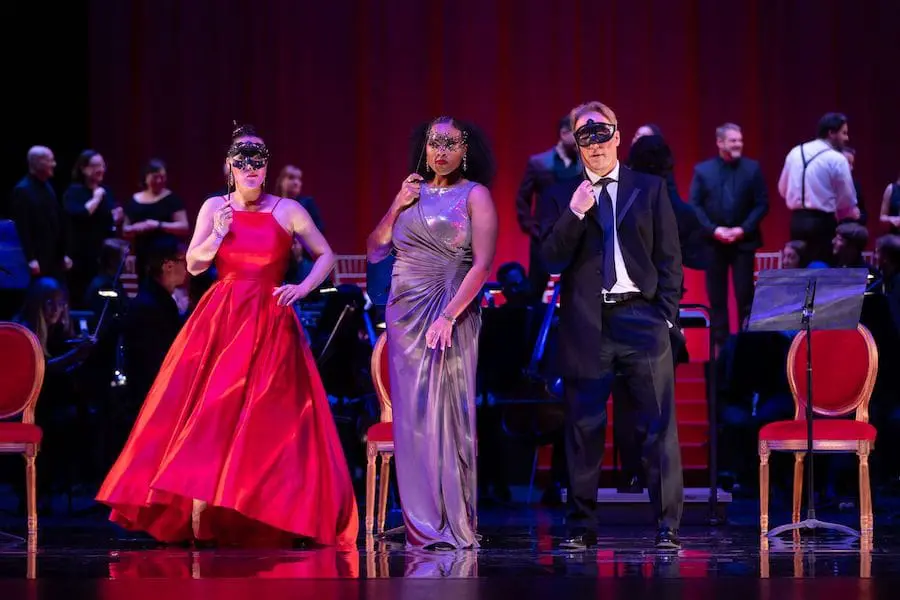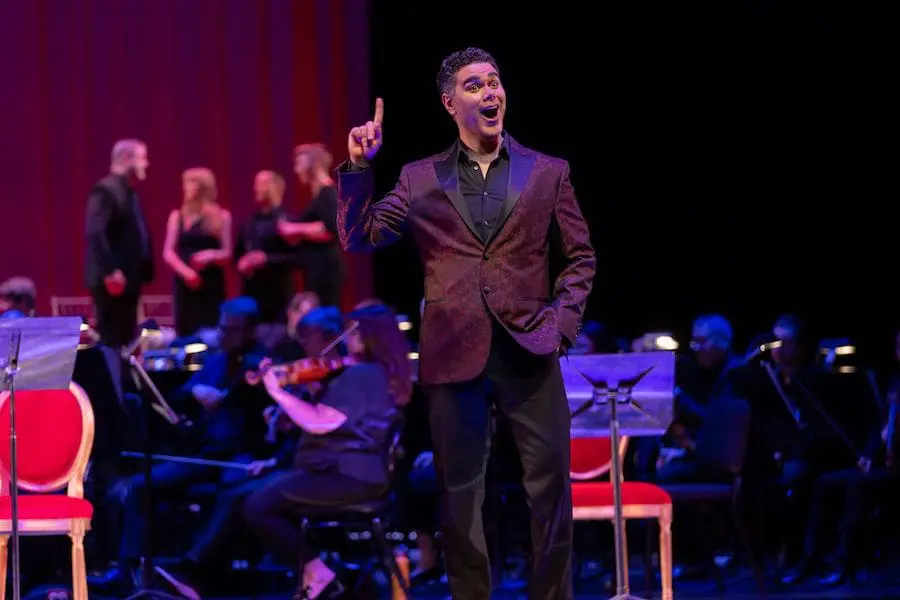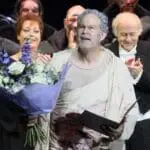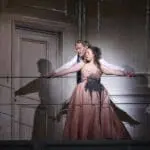When Edmonton Opera’s Artistic Director, Joel Ivany, remodels an operatic classic, its semblance to the original could be generously described as approximate. His ‘transladaptation’ of Mozart’s Cosi fan tutte, reimagined as A Little Too Cozy, for his erstwhile home at Against the Grain Theatre in Toronto, placed the 18th-century opera in a TV studio, site of a Bachelor/Bachlorette-type reality show. Ivany’s transladaptations veer decidedly far from the original libretto, as well, venturing unabashedly into more than topical references to modernize the story line. His idiom is contemporary, and in Mozart’s case, the composer’s librettist, Da Ponte, can lose his connection to reimagined story entirely.
Ivany brought some of his innovative notions of updating the old art form to Edmonton Opera’s most recent production (Feb. 1 and 3) with a staged concert presentation (the word production would exaggerate) of Don Giovanni, Ivany style. The stripped-down staging of this Don Giovanni had no sets, but it was performed on the Jubilee Auditorium stage, with the Edmonton Symphony, led by the company’s Music Director, Simon Rivard, assembled midway between the apron and the back wall. The singers, dressed nicely but not in costumes, began the evening downstage, seated on red-upholstered chairs behind music stands. The overture was played, and then the tale of a womanizing deceiver, likely a rapist, was sung in English with plenty of local colour, and the audience ate up. (Da Ponte’s name was replaced with Ivany’s as librettist in the program).
As I said, liberties were taken. At the beginning, after the Don (Elliot Madore) has had his way with Donna Anna (Jonelle Sills), he is confronted by her father, the Commendatore (Ben Sieverding), but dad isn’t fatally stabbed in dual, as he is in the original; he collapses with a heart attack. As he pleads for his medication, the Don stands over him, taunting him with the life-saving pill bottle. This early scene of sociopathic menace is as close as we come to seeing a Don Giovanni destined for eternal torment, ushered off to the inferno by a horde of demons.
This Don Giovanni was set in Alberta, and so the Don’s put-upon servant Leporello (Justin Welsh) sang of his master’s conquests in places like Grande Prairie, not Italy or Spain. An early chaotic situation was called “a shitshow,” (not canonical operatic language), and references were made to Tim Hortons, Tik Tok and the like. Characters texted each other, injecting a convention into the proceedings that everybody in the room could relate to. Towards the end of Act two, the Don and Leporello broke into a few bars of Hey Jude and some other pop material I didn’t know. The playfulness that all this implies pleased the audience tremendously, and the ovation the performers received at the end was roaring.

Andrea Núñez, Jonelle Sills, and John Tessier © Nanc Price
Ivany has regularly declared that his aim is to keep opera alive, to keep it economically viable, and to attract the next generation of audience. On this last ambition, this season, he’s giving away tickets to anyone under 21, and there were plenty of younger folks in the opening night crowd. He cut about an hour out of the original, offering a product he believes busy people, especially those unfamiliar with the art form, will find empathetic. (Toronto audiences are currently seeing a full-length, full production of the Mozart masterpiece.) Ivany’s ethos may have led to a Don Giovanni that, despite its evil protagonist, and the many broken hearts he’s left in his self-indulgent wake, felt more like the opera buffa Mozart intended it to be. Judging from the audience’s approval of the comic tone, Ivany got his Don Giovanni right. In fact, in this show, no demons apprehend this reprobate. He did fall, but it looked like his end could be blamed on too much cocaine. No demons, no hellfire. A thoroughly modern, secular conclusion! And much like Falstaff after he gets his comeuppance in The Merry Wives of Windsor, the dead Don was reunited, none the worse for ware, with his erstwhile victims. It was a cheery finale.
The music was unadulterated Mozart, however, and the cast of singers Ivany, their director, enlisted was a mix of more or less experienced traditional opera singers, several of whom had worked with him at Against the Grain. If there had been a set, they would have done pretty much what they did in this rudimentary staging. They all acted their roles comfortably, and entertainingly. Despite its billing as a kind of concert presentation, this was no stand-and-deliver affair. Chairs were overturned; a music stand was wielded as a weapon. The Edmonton Opera Chorus played various roles, including party guests and an avenging mob. In a confrontation between the Don and Zerlina’s (Mireille Asselin) betroth, Masetto (Peter Monaghan), Masetto took a pretty realistic beating.
Andrea Núñez brought a nice mix of indignation and romantic obsession to her role as Donna Elvira. Local tenor John Tessier, an Edmonton Opera regular, sang his part as Donna Anna’s long-suffering suitor with great dignity and classical opera demeanour, when he wasn’t brandishing a music stand. Walsh sang Leporello with fine comic exasperation, and when he impersonated the Don to buy him some time with Zerlina, he elevated the comic antics giddily.
Elliot Madore’s Don was an odd thing, if he was supposed to elicit harsh judgment and scorn. He drew loads of laughs, and his oily charm certainly made his seducer credentials plausible, but, and maybe it was in keeping with the buffa commitment to the project, he almost never exuded the energy of a dangerous man. Edmonton Opera’s two-show hybrid Don Giovanni appeared to be a hit with its opening night audience. It was, as the younger generation might say, ‘different’, but Ivany definitely produced a crowd-pleasing entertainment that preserved the musical texture of a Mozart opera, but cut it with a pragmatic, care-free revamping of a classic work left for modern recreators to mess with.
Related Content ↘
Opera Canada depends on the generous contributions of its supporters to bring readers outstanding, in-depth coverage of opera in Canada and beyond. Please consider subscribing or donating today.















